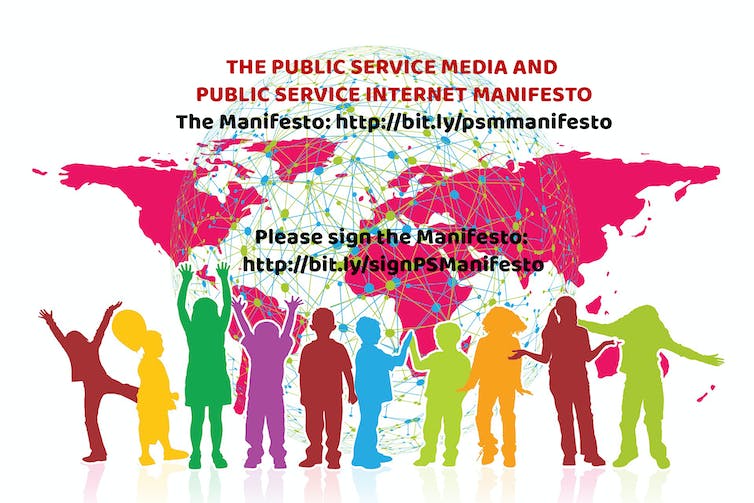The UK government is reported to be pushing ahead with an investigation into privatising Channel 4, reversing its 2017 decision that the broadcaster was a “precious public asset” that would “continue to be owned by the country”.
Channel 4 was founded in 1982 with a public service remit to create “media content of high quality” that reflects “a culturally diverse society”, to “promote measures intended to secure that people are well-informed and motivated to participate in society in a variety of ways”, and to “support and stimulate well-informed debate”.
In just under four decades, Channel 4 has developed a reputation for its coverage of news and current affairs, introducing flagship programmes such as the hour-long Channel 4 News, the documentary programme Dispatches), and the debate format After Dark. Together with the BBC, Channel 4 has helped to establish in the UK a strong public service media offering of high-quality news, documentaries and cultural programming as part of its mix, alongside reality TV, drama and comedy.
The BBC and Channel 4 are non-profit media organisations that are editorially independent from governments and private companies and have a public service remit. In the “post-truth era”, in which trust in news is at a premium, this model should not be undermined, but sustained and expanded.
But instead, public service media is under attack. It has been widely reported that the Johnson government has investigated abolishing the BBC licence fee, while in 2020 it announced its intentions to decriminalise licence-fee evasion. Meanwhile a campaign to #DefundTheBBC has trended on social media. Research has shown that the BBC’s real, inflation-adjusted public funding has fallen by 30% over the past ten years. Now the future of Channel 4 as a public broadcaster is in doubt as well.
Unhappy online
Research indicates that we need more public service media, not less – and not just in broadcasting. For the netCommons research project, a team of researchers I led found that a lot of people have reservations about the business model of many large social-media companies operating online.
In response to our survey of 1,000 internet users, 82.4% expressed concern about YouTube and Facebook’s use of personal data and 78.7% said there are too many advertisements online, rising to 82% when it comes to targeted online adverts, the main business model for some internet giants. A massive majority, 87.6% of respondents, expressed interest in non-monopolistic alternatives to YouTube, Facebook, Twitter and Google.
That internet users are critical of the corporate practices of online platforms is nothing new. Back in 2009 I conducted a case study of social media that showed that while users place a high value on the services such platforms provide, at the same time they can be very critical of their business practices.
More recently, as part of the research network InnoPSM: Innovation in Public Service Media Policies, led by Alessandro D’Arma and Minna Horowitz, I conducted an exploratory study in 2020 of the future of the internet and public service media, involving 141 media researchers and audience members. This study will be available by the autumn of 2021 as a chapter in a book focused on the idea of a public service internet, published by University of Westminster Press.
Study participants stressed the importance of public service media for providing high-quality news, information, educational programmes and documentaries – vital for democracy and a vibrant public sphere. Research also suggests that citizens across Europe tend to trust public service media – during the COVID-19 pandemic it has represented the most used and one of the most trusted information sources.
Towards a public service internet
Our study participants also envisioned an alternative, advertising-free, non-commercial, not-for-profit internet, with digital archives of public service content available to everyone for an unlimited period from anywhere at any time.
Leading on from this study, myself and Klaus Unterberger, the head of ORF Public Value – a department of the Austrian Broadcasting Corporation focused on studying the media’s public value – led a group of around 50 media researchers and practitioners in an online forum on the future of public service media and the internet. The four-month debate resulted in the Public Service Media and Public Service Internet Manifesto, a collective mission statement for the defence of public service media and the creation of a public service internet, which has been signed by around 500 individuals concerned about the future of the media, including the philosopher Jürgen Habermas.
The manifesto demands the safeguarding of the existence, independence and funding of public service media such as the BBC and Channel 4 as well as the development of a public service internet and the resourcing of public service media to provide online platforms to support this.
It has ten key principles, ranging from the need for the safeguarding of public service media, to a public service internet supported by sustainable funding mechanisms such as a licence fee or the Nordic model of a public service tax. A public service internet would be required to promote equality and diversity and to provide opportunities for public debate, participation and the advancement of social cohesion.
In an age of “fake news” and post-truth politics, the existence of high-quality media organisations both in broadcasting and online is more critical than ever. There’s a crying need for a news media that serves public, not private, interests. They should be media of the public, by the public, and for the public – media of the public sphere.
Image: Wikimedia, Oxfordmale













